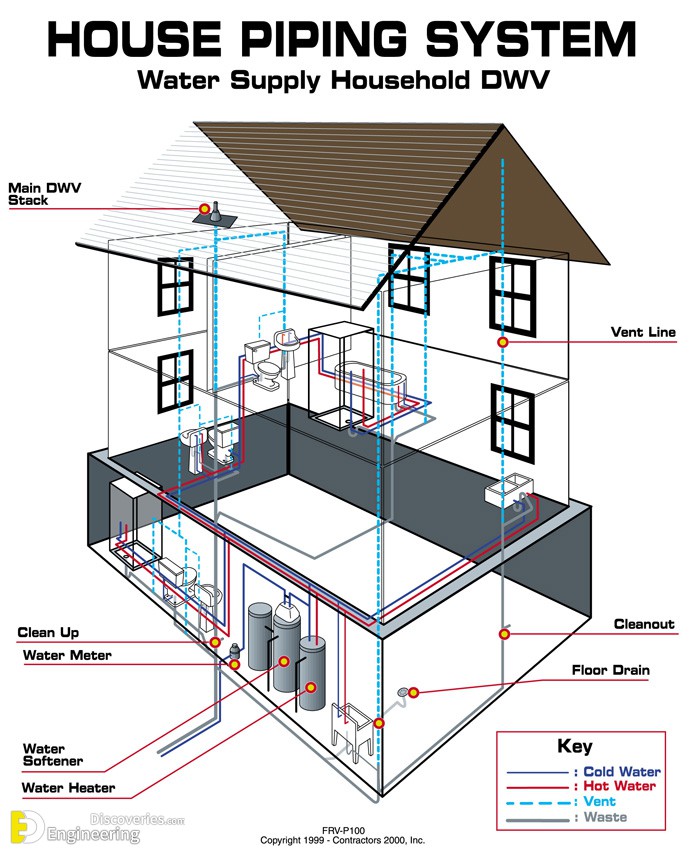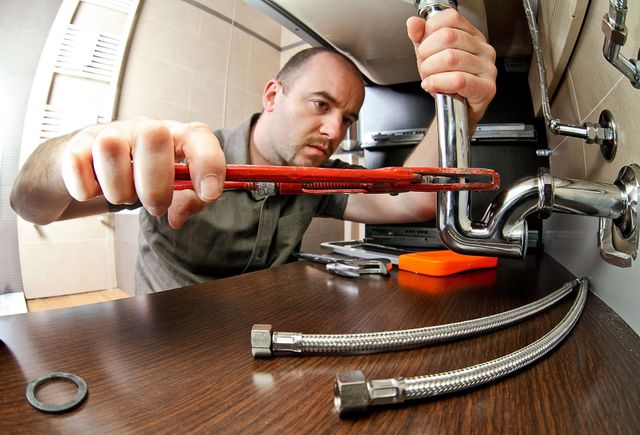The Complete Look at Your Home's Plumbing System Anatomy
The Complete Look at Your Home's Plumbing System Anatomy
Blog Article
What are your ideas regarding Exploring Your Homes Plumbing Anatomy?

Recognizing exactly how your home's pipes system works is crucial for each home owner. From providing tidy water for alcohol consumption, cooking, and showering to safely eliminating wastewater, a properly maintained plumbing system is vital for your family's wellness and comfort. In this thorough overview, we'll explore the elaborate network that composes your home's plumbing and offer ideas on maintenance, upgrades, and taking care of usual issues.
Introduction
Your home's pipes system is greater than simply a network of pipelines; it's an intricate system that ensures you have access to clean water and efficient wastewater removal. Knowing its elements and exactly how they collaborate can aid you protect against pricey fixings and ensure everything runs smoothly.
Basic Components of a Plumbing System
Pipes and Tubes
At the heart of your plumbing system are the pipes and tubing that carry water throughout your home. These can be made of various materials such as copper, PVC, or PEX, each with its benefits in regards to toughness and cost-effectiveness.
Components: Sinks, Toilets, Showers, and so on.
Fixtures like sinks, commodes, showers, and bath tubs are where water is used in your home. Understanding exactly how these fixtures connect to the plumbing system helps in diagnosing problems and intending upgrades.
Shutoffs and Shut-off Factors
Shutoffs manage the flow of water in your pipes system. Shut-off valves are vital throughout emergencies or when you require to make repair work, enabling you to separate parts of the system without interfering with water circulation to the entire home.
Supply Of Water System
Main Water Line
The main water line connects your home to the community supply of water or a personal well. It's where water enters your home and is distributed to various fixtures.
Water Meter and Stress Regulatory Authority
The water meter procedures your water usage, while a pressure regulator ensures that water flows at a safe stress throughout your home's pipes system, avoiding damage to pipelines and components.
Cold Water vs. Warm water Lines
Comprehending the distinction between cold water lines, which provide water straight from the primary, and warm water lines, which bring heated water from the water heater, aids in fixing and planning for upgrades.
Water drainage System
Drain Pipes and Traps
Drain pipelines bring wastewater away from sinks, showers, and bathrooms to the sewer or septic system. Traps prevent sewage system gases from entering your home and likewise trap particles that could create blockages.
Ventilation Pipes
Air flow pipes permit air right into the drain system, avoiding suction that can slow down water drainage and trigger catches to empty. Correct air flow is crucial for preserving the honesty of your plumbing system.
Relevance of Appropriate Water Drainage
Guaranteeing appropriate drainage stops backups and water damage. Regularly cleaning up drains pipes and maintaining traps can protect against expensive fixings and extend the life of your pipes system.
Water Heating System
Kinds Of Hot Water Heater
Water heaters can be tankless or conventional tank-style. Tankless heating systems heat water as needed, while containers store warmed water for prompt use.
Upgrading Your Pipes System
Factors for Upgrading
Upgrading to water-efficient components or changing old pipelines can improve water quality, minimize water costs, and increase the value of your home.
Modern Plumbing Technologies and Their Advantages
Discover modern technologies like smart leakage detectors, water-saving commodes, and energy-efficient water heaters that can save money and minimize ecological impact.
Cost Factors To Consider and ROI
Compute the in advance expenses versus long-term financial savings when taking into consideration plumbing upgrades. Several upgrades pay for themselves with lowered utility expenses and fewer repair services.
Just How Water Heaters Connect to the Plumbing System
Understanding exactly how hot water heater link to both the cold water supply and warm water circulation lines aids in diagnosing issues like insufficient hot water or leaks.
Maintenance Tips for Water Heaters
On a regular basis purging your hot water heater to get rid of debris, examining the temperature level setups, and evaluating for leaks can extend its lifespan and boost power performance.
Common Plumbing Issues
Leakages and Their Reasons
Leakages can happen because of aging pipes, loosened installations, or high water stress. Attending to leaks quickly avoids water damage and mold development.
Blockages and Obstructions
Clogs in drains and commodes are commonly triggered by flushing non-flushable items or a build-up of oil and hair. Utilizing drain displays and bearing in mind what decreases your drains can protect against obstructions.
Indications of Plumbing Troubles to Look For
Low water stress, slow drains pipes, foul odors, or abnormally high water expenses are signs of potential pipes issues that ought to be addressed promptly.
Pipes Maintenance Tips
Regular Examinations and Checks
Arrange annual pipes evaluations to catch concerns early. Try to find signs of leakages, rust, or mineral buildup in taps and showerheads.
DIY Upkeep Tasks
Basic tasks like cleansing faucet aerators, looking for bathroom leakages utilizing color tablet computers, or insulating revealed pipes in chilly climates can protect against major pipes problems.
When to Call a Professional Plumbing Professional
Know when a plumbing problem requires specialist competence. Attempting complicated repairs without appropriate knowledge can bring about more damages and higher repair service costs.
Tips for Minimizing Water Usage
Easy behaviors like repairing leakages promptly, taking much shorter showers, and running complete loads of washing and recipes can save water and lower your energy bills.
Eco-Friendly Pipes Options
Take into consideration sustainable pipes products like bamboo for flooring, which is durable and green, or recycled glass for countertops.
Emergency situation Readiness
Steps to Take During a Pipes Emergency
Know where your shut-off valves lie and just how to turn off the water in case of a burst pipe or major leakage.
Importance of Having Emergency Get In Touches With Convenient
Keep get in touch with details for local plumbing professionals or emergency services readily offered for fast response during a pipes crisis.
Environmental Effect and Preservation
Water-Saving Fixtures and Appliances
Setting up low-flow taps, showerheads, and commodes can dramatically reduce water usage without giving up performance.
DIY Emergency Situation Fixes (When Relevant).
Temporary solutions like utilizing duct tape to patch a dripping pipeline or putting a pail under a trickling tap can decrease damages till a professional plumbing shows up.
Final thought.
Comprehending the composition of your home's plumbing system equips you to preserve it efficiently, saving time and money on repair services. By complying with routine maintenance routines and staying educated concerning modern plumbing technologies, you can ensure your plumbing system operates efficiently for many years ahead.
HOW YOUR PLUMBING SYSTEM WORKS
Which Pipes Do What?
Blue lines = fresh water supply entering the building Red lines = hot water supply entering the building Grey lines = pipes carrying waste away from the building and venting pipes carrying gases away from the building (through the roof) YOUR MAIN PLUMBING SYSTEMS
There are two main plumbing systems that support your home s basic plumbing needs one that brings clean water into your home, and one that sends dirty water away from your home. Connected to the toilet, bath, shower, and other faucets in your home, these two systems keep your water flowing in the right directions.
ACCESSING FRESH WATER
Fresh and clean water is brought into your home through the main water supply line . Filtered through one pipe, this water is pressured to flow into the various fixtures in your home at any given time.
This water can be sourced from a well located on your property, a pond or river (mostly cottages), or, as in most cases, from the city s municipal water treatment centre. However, it is important to note that water that is untreated, such as the water siphoned from ponds or rivers, may not be safe to drink. Personal water supplies always need to be treated for hardness and contaminants before consumed.
MUNICIPAL WATER SUPPLIES
Improve taste and odour Remove sediment Eliminate hardness Reduce chlorine COLD WATER SUPPLY VS. HOT WATER SUPPLY
Cold water flows into your home or building through the service line, which then distributes hot or cold water to your fixtures. This line is most commonly run through a central column that runs floor to floor. Hot water runs in short and straight pipes as the longer the pipeline, the more heat that will be lost in the transfer. Having shorter pipes also allows residents to access hot water more quickly.
WASTE WATER SYSTEM
Your wastewater system is divided into two parts pipes that send wastewater away from your home and venting pipes that send sewer gas away from your home. Sewage water travels through pipes that flush the water and waste towards local sewers that are operated and managed by your city or town. Most sewer systems rely on gravity to move the wastewater to where it needs to go.
The further away from your toilet or sink, the larger wastewater pipes become. This allows for waste to be disposed of from various parts of your home or business at once without pipe blockages. The angle and flow of these pipes are also essential for keeping your waste pipes clear of build up.
https://harrisplumbing.ca/how-your-home-plumbing-system-works/

Hopefully you enjoyed reading our part about The Inner Workings of Your Home's Plumbing. Thanks a ton for finding the time to read through our article. Be sure to pause to promote this blog post if you appreciated it. I praise you for your time. Kindly come by our website back soon.
Go Company Report this page